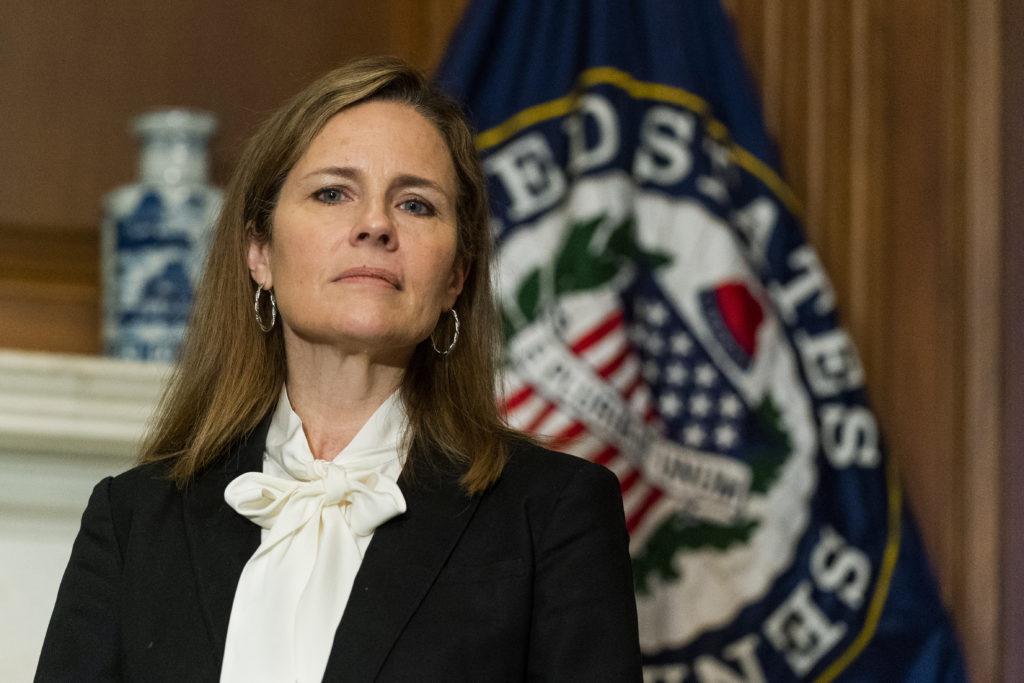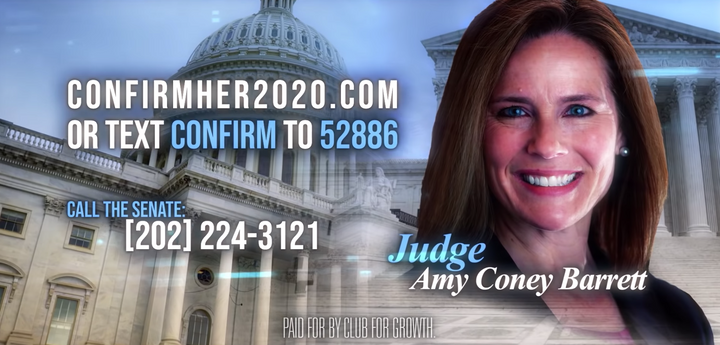The Supreme Court under Chief Justice John Roberts has been extraordinarily friendly turf for corporations. It has been more than four years since the Court has reversed a lower court decision favoring corporate interests, according to a new analysis by the Constitutional Accountability Center, a progressive think tank.
Now, with the clock ticking for Senate Republicans to confirm President Trump’s Supreme Court nominee, federal judge Amy Coney Barrett, the groups that helped push through Trump’s two previous nominees are again ready to spend tens of millions of dollars on advertisements to ensure Barrett receives the lifetime appointment.
With 53 Senate Republicans in this soon-to-end 116th Congress, Majority Leader Mitch McConnell needs to prevent no more than three defections to confirm Barrett with a simple majority. Two Republicans have publicly expressed disapproval of confirming Trump’s nominee so close to the election, Senators Susan Collins of Maine and Lisa Murkowski of Alaska, though it is not clear they have unequivocally committed to voting against Barrett—and the developing coronavirus outbreak among Republican senators is changing the vote count and confirmation timeline.
The conservative groups spending millions on television, digital, and direct mail ads hope to shore up GOP support for a nominee who is expected to be anti-abortion, socially conservative, and favorable to corporate interests.
All signs indicate that a potential Justice Barrett would continue the pro-corporate tilt of the Court. According to an analysis by the nonpartisan watchdog group Accountable.us, Judge Barrett sided with corporations over people 76% of the time on the 7th Circuit Court of Appeals, in 44 of 55 cases reviewed. For example, in the 2018 case of Bruce Betzner and Barbara Betzner v. The Boeing Company, Barrett voted to reverse a district court’s decision to send a personal injury lawsuit back to state courts, the outcome Boeing was seeking. In August, Barrett delivered a ruling that could block gig workers from suing when tech companies deny them overtime pay, according to a report from The Daily Poster.
The Roberts court has been stuffing its docket with cases in which lower courts ruled against corporate interests—fully 91% in the 2018-2019 term. Already on the docket for the term that starts on Oct. 5 are a number of cases that involve state rulings: Ford Motor Co. v. Montana Eighth Judicial District Court, which could limit where individuals can pursue personal injury suits; Rutledge v. Pharmaceutical Care Management Association, on whether states can regulate pharmacy benefit managers; and Carney v. Adams, on whether states can require judges to be affiliated with one of the two major political parties. Other cases to be heard by the Supreme Court will feature deceptive commercial activities, arbitration agreements that limit peoples’ ability to sue corporations, and even the enforcement of IRS reporting requirements.
Many of the top funders of groups backing Barrett, including many Republican megadonors, are billionaire corporate executives—in industries like manufacturing, transportation, shipping supplies, and private equity financing—whose economic outlooks could benefit from Barrett being confirmed to the vacant seat.
Here are the top donors to conservative groups spending on the Barrett confirmation, according to FEC data from Jan. 1, 2019 to Aug. 31, 2020:
Club For Growth
The right-wing Club For Growth, known for backing far-right candidates against moderate Republican incumbents and a past recipient of funding from the Koch-linked Center to Protect Patient Rights, recently pledged to spend $5 million on ads to back Trump’s nominee. The group’s nonprofit arm received nearly $6.8 million from undisclosed donors from July 2017 through July 2018, according to tax documents. Its super PAC, Club For Growth Action, has reported receiving nearly $56 million in the 2020 election cycle, according to data from the Center for Responsive Politics.
Club For Growth President David McIntosh said in a statement praising Barrett, “This choice will shape America’s future, as the Court considers cases relating to issues like the constant unconstitutional growth of government and whether federal agencies should have free rein to enact arbitrary rules without Congressional approval.”

Club For Growth has had huge support this year from Republican megadonor Richard Uihlein, the right-wing founder of shipping supplies company Uline, whose donations total $26.5 million this election cycle. Uihlein contributed $10 million to Club For Growth Action, the group’s super PAC, on Jan. 12, then $4 million on April 21 and another $10 million on August 8, according to FEC records.
Right-wing billionaire Jeff Yass, co-founder of financial firm Susquehanna International Group, donated over $17.5 million to the super PAC this cycle. Yass, a Pennsylvania-based options trader, has also contributed over $4 million to the conservative Protect Freedom PAC this cycle, making up the vast majority of its funding as reported in FEC records.
Also in this cycle, Club For Growth Action received over $2.1 million from the late Republican megadonor Richard Gilder, who died in May of congestive heart failure at the age of 87, and his ex-wife Virginia James. James has donated to the conservative Wisconsin state judge David Prosser in a 2011 recount battle and other Koch-related causes.
Richard and Barbary Gaby contributed over $1.6 million to Club For Growth Action. Barbara Gaby is the youngest child of Amway co-founder Jay Van Andel, who, with the DeVos family, has been a major funder of the the Heritage Foundation, a right-wing think tank, the American Legislative Exchange Council (ALEC), a nonprofit that helps Republican legislators collaborate with corporate lobbyists, and the Center for International Private Enterprise, a non-profit affiliate of the U.S. Chamber of Commerce.
America First Action
The pro-Trump super PAC America First Action is also promising ad buys totaling $5 million to promote Barrett in national television, digital and direct mail. Its nonprofit arm, America First Policies, took in $22 million in 2017 from donors whose identities it was not required to publicly disclose, while the PAC has received nearly $83 million this cycle, according to data from the Center for Responsive Politics.
The leading donors to the Trump super PAC, at $10 million apiece, have been Republican megadonor Timothy Mellon, the majority owner of transportation holding company Pan Am Systems, and Kelcy Warren, the billionaire co-founder and CEO of pipeline company Energy Transfer Partners whose Dakota Access pipeline has been mired in court battles over its potential to pollute key water sources in South Dakota.
Geoffrey Palmer, a Republican donor and billionaire real estate developer based in Los Angeles, has donated $6 million to America First Action. Richard and Elizabeth Uihlein threw in over $2.7 million. Three more familiar Trump megadonors have chipped in: Linda McMahon, the former pro wrestling executive who is now the super PAC’s chairwoman, with over $3.5 million; Blackstone Group CEO Stephen Schwarzman, with $3 million; and Diane Hendricks of Wisconsin, chair of a roofing supply company and a Republican megadonor, with $2 million.
Richard DeVos, co-founder of Amway and husband of Secretary of Education Betsy DeVos, has contributed $400,000 to America First Action. GOP megadonor Marlene Ricketts, wife of TD Ameritrade founder Joe Ricketts, has given half a million dollars to the PAC.
Americans For Prosperity
Through a standalone website and by mobilizing its membership, the Koch brothers-founded libertarian advocacy group says it has sent 200,000 letters in support of Barrett to U.S. senators in the past week. The group’s super PAC has spent over $20 million this cycle in independent expenditures.
The majority of that amount has come from $7 million from Charles Koch’s fossil fuel conglomerate Koch Industries and close to $6.5 million from the Koch network’s Freedom Partners Action Fund, but several more corporate megadonors have given to Americans For Prosperity Action this cycle. Major GOP donor Ron Cameron, president of the Little Rock, Arkansas-based Mountaire Corporation, a chicken products producer, has contributed $3.5 million. Richard “Dick” Haworth, the former CEO of an eponymous office-interiors manufacturer company, and his wife Ethelyn contributed $1.5 million to AFP Action. Haworth attended an exclusive Vail, Colorado retreat convened by the Koch Brothers for donors who had given over $1 million to right-wing causes. Trucking executive Clarence L. Werner, a previous million-dollar donor to the Kochs’ Freedom Partners super PAC, kicked in $1.5 million on July 1. Individuals from several energy, timber, pipeline, and coal companies have given at least $100,000 each to the PAC.
Judicial Crisis Network
The Judicial Crisis Network’s leading role in the communications push to confirm Trump’s nominees has been funded recently through some $30 million received between July 2018 and June 2019, led by a $15.9 million donation from an anonymous donor, according to IRS records reviewed by the Daily Poster. JCN is organized as a “social welfare” nonprofit and is not required to disclose the identities of its donors.
In 2017, a secret donor behind a $17 million gift readied JCN for the Kavanaugh confirmation showdown, providing over three-fourths of the total amount it received that year. Together in the efforts to confirm Kavanaugh and Neil Gorsuch in 2017, JCN was estimated to have laid out $22 million.
Three additional groups on the right have said they’ll be spending money on efforts to confirm Barrett: anti-abortion nonprofit Susan B. Anthony List, conservative nonprofit Catholic Vote, and conservative, anti-LGBT nonprofit think tank American Principles Project. The Susan B. Anthony list has reported raising a bit over $1 million to its PAC this cycle from hundreds of donors giving $5,000 and below, while its non-profit arm received over $12 million in funding according to its most recent Form 990, for 2018.
Millions More Spent on State Judicial Races
While the Supreme Court hears cases involving lower courts’ rulings on consumer lawsuits and government regulations, the conservative groups pushing Trump’s nominees have also spent millions to influence state judicial races.
A December 2019 report by the nonpartisan policy institute Brennan Center for Justice, titled “The Politics of Judicial Elections, 2017–18,” noted that JCN quietly spent $3.8 million on state elections in those years. After JCN donated nearly $1 million last year to the Republican State Leadership Committee, a national 527 group dedicated to electing Republicans to state office, the RSLC transferred $1.2 million to the Judicial Fairness Initiative, which works as an effort under the RSLC to elect conservative state judges. In the 2018 election cycle, the Judicial Fairness Initiative received over $4.3 million from RSLC, according to IRS records compiled by the Center for Responsive Politics.
The Brennan Center tracked how in 2013-14, JCN sent half a million dollars to Wisconsin Club for Growth, which spent money that cycle for the successful reelection campaign of conservative Justice Patience Roggensack. In May, during oral arguments in front of the Wisconsin Supreme Court regarding a stay-at-home order issued by the state health department, Justice Roggensack appeared to downplay the importance of some cases by contrasting the workers at a meatpacking plant who had been exposed to a coronavirus outbreak with “the regular folks in Brown County.” She then joined the majority on the state Supreme Court in a 4-3 decision to strike down the order, which was supported by Democratic Gov. Tony Evers.
The Judicial Ads Act, introduced in the Senate on July 2 by Dianne Feinstein (D-Calif.) and Sheldon Whitehouse (D-R.I.), would bring transparency to secretive groups like those that blasted out ads promoting Kavanaugh’s confirmation. The bill would require any group spending at least $50,000 in a year on federal judicial nomination advertisements to disclose the identity of any donor giving $5,000 or more. Recently introduced in a House version as well by Rep. Zoe Lofgren (D-Calif.) and Rep. Hank Johnson (D-Ga.), the measure is supported by the nonpartisan watchdog Campaign Legal Center. It could be taken up by Congress next year—most likely, if Democrats take control of the Senate—as part of the next version of H.R. 1, the For the People Act, a sweeping ethics package passed by the Democratic House in March 2019 that is not supported by any Republicans in Congress.

